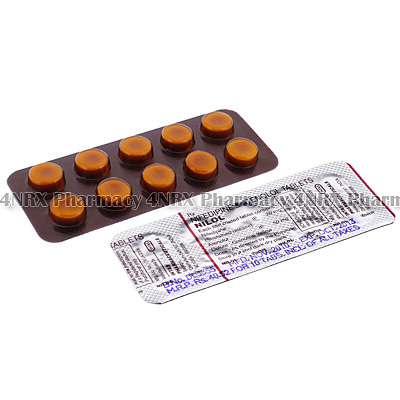| Active Ingredient |
Nifedipine / Atenolol |
| Manufacturer |
Intas Pharmaceuticals Ltd. |
| Origin |
India |
| Reference |
N/A |
What is Nilol (Nifedipine/Atenolol) used for?
Nilol (Nifedipine/Atenolol) is a combination of a calcium channel blocker and a beta-blocker used to treat patients suffering from high blood pressure or angina. The medication relaxes the blood vessels to allow easier circulation and reduces the strain placed on the heart while operating. Your physician may also prescribe it to treat other unlisted conditions.
How should I use Nilol (Nifedipine/Atenolol)?
Nilol (Nifedipine/Atenolol) is typically taken once daily at a dosage of one tablet, but your individual regimen will be based on your health condition and the severity of your symptoms. These should be swallowed with a large glass of water and can be taken on an empty stomach, but a meal is recommended before use if you get an upset stomach. Do not change the form of the tablets prior to use to avoid destroying or altering the effects of their contents. Ask your pharmacist or physician any questions you have about the medication to ensure the correct administration.
What are the side effects of Nilol (Nifedipine/Atenolol)?
Side effects associated with the use of Nilol (Nifedipine/Atenolol) are:
- Headaches
- Dizziness or drowsiness
- Nausea or vomiting
- Upset stomach, constipation, or diarrhea
- Joint pain or muscle cramps
- Insomnia
- Increased urination
- Mild skin rash or irritation
- Flushing of the skin
Serious side effects that may occur during treatment include deterioration of angina symptoms, faintness, trouble breathing, chest pain, irregular heartbeats, tingling sensations, unusual swelling, or jaundice. Immediately inform your physician about any intense or worrying side effects you experience to make sure the correct alterations are made to your regimen to prevent further problems. These may include lower doses, reduced frequency of administration, or emergency medical attention in serious cases.
Please Note
Do not begin using Nilol (Nifedipine/Atenolol) if you are pregnant, breastfeeding, if the patient is a child, or if you have bradycardia, uncontrolled heart failure, cardiogenic shock, 2nd or 3rd degree heart block, hypotension, peripheral arterial disorders, an untreated tumor affecting the adrenal gland, metabolic acidosis, severely decreased kidney function, or if you have recently had a heart attack. It is also important to inform your physician if you are elderly or have psoriasis, severe angina, chronic obstructive pulmonary disease, a history of heart failure, a history of asthma, diabetes, an overactive thyroid gland, myasthenia gravis, hypoglycemia, 1st degree heart block, a history of allergies, decreased kidney function, or decreased liver function. These conditions may cause unexpected problems during treatment requiring special adjustments to your regimen.
Strictly follow all instructions provided to you by your physician or pharmacist while using Nilol (Nifedipine/Atenolol). Optimum and safe dosage can differ based on the patient and the condition being treated.
As this medication may be unsafe for certain patients, it is essential you always inform your physician if you are pregnant or breastfeeding, as well as if you have any allergies, other illnesses, or ongoing health conditions, and if you are taking any other form of medication, supplements, or herbal products.
Immediately seek emergency medical care if you have an allergic or hypersensitive reaction. Common signs of a reaction include hives, swelling, skin rashes, chest pains, as well as trouble breathing or swallowing.

 Shopping Cart
Shopping Cart
 Items:
0
Items:
0
 Subtotal:
$
0
Subtotal:
$
0
 Heart
Heart  Nilol (Nifedipine/Atenolol)
Nilol (Nifedipine/Atenolol) 





